ORIGINAL ARTICLE
WIECZORKIEVICZ, Alessandra Krauss [1], SANTOS, Adelcio Machado dos [2], BAADE, Joel Haroldo [3]
WIECZORKIEVICZ, Alessandra Krauss. SANTOS, Adelcio Machado dos. BAADE, Joel Haroldo. The Profile of the Sociology professor at the Canoinhas / SC Regional Education Coordination. Revista Científica Multidisciplinar Núcleo do Conhecimento. Year 06, Ed. 01, Vol. 04, pp. 141-166. January 2021. ISSN: 2448-0959, Access Link: https://www.nucleodoconhecimento.com.br/education/sociology-professor, DOI: 10.32749/nucleodoconhecimento.com.br/education/sociology-professor
SUMMARY
Sociology as a school component has fundamental attributes for the construction of a better society, through the training of its students. His contribution to society is the subject of debates and discussions in various social contexts. Based on this assumption, so that the sociological contribution happens fully in the formation of students, the figure of the sociology teacher comes into the spotlight. Being protagonist in the formation of its students. Therefore, this study has as object of research to analyze the profile of sociology teachers of the Regional Coordination of Education of Canoinhas / SC. In this direction, research of quantitative nature, with closed questionnaires were used for the application of interviews to the 16 sociology teachers. In order to understand the profile of this teacher who is teaching the discipline of Sociology in the Coordination. It was concluded with this research, that the professor of sociology, teaches in addition to sociology, other disciplines to complement his workload, not exclusively dedicating himself to preparing and teaching sociology classes, moves to the other municipalities of the Coordination and has not been working in the classroom for a long time. From this analysis, it is possible to understand who this teacher is and whether he faces difficulties in the process of teaching Sociology in high school.
Keywords: Sociology, teacher, profile, High School.
INTRODUCTION
The reflection expressed in this article started from the inquiry about the Professor of Sociology of High School of the Regional Coordination of Education of Canoinhas / SC.
The theme was chosen, due to the importance of understanding the profile of this education professional. His performance in the classroom is a predominant factor in the construction of sociological knowledge, produced in sociology classes in high school.
From this perspective, the importance of the development of this article is justified, which is to analyze the profile of this teacher, who is taught the discipline of Sociology in High School at the Coordination of Canoinhas. Thus, we seek the interest around the theme and the importance of this study to understand who is the professor of Sociology.
From here the article, it is divided into 3 parts. At first, it will be worked with the text professor of Sociology. In the second moment, presentation of the methodology used in the article. And finally, the exposure of the research data and final considerations.
PROFESSOR OF SOCIOLOGY
The teacher is an important agent of social transformation and also influential in the school life of his students. It plays a role in the formation and social construction of individuals in society.
In view of this, Durkheim (1978, p. 23) states that “the teacher is a great interpreter of the great moral ideas of his country and its time”. With this direction of transformer and collaborator of the society in which it is inserted.
In this sense, it is through the sociology professor that the student is most often encouraged to think, analyze and produce his sociological knowledge. Rios (2001, p.131) presents the importance of the teacher in the social context: “Now, to be a teacher, seriously and rigorously, is to bring a contribution to the discovery of the world by students, is to provide growth and joy with the construction and reconstruction of knowledge”. Libâneo (2012, p. 431) still points out some skills of the teacher as a knowledge builder, professional, responsible for the school organization and training of its students:
The teacher’s professional practice comprises at least three attributions: teaching, the work in the organization and management of the school and the production of pedagogical knowledge. As a teacher, you need specific professional preparation to teach content, give individual accompaniment to students and evaluate learning, manage the classroom, teach values, attitudes and norms of social and collective coexistence. […] as a professional who produces knowledge about his work, he needs to develop skills in the development and development of research projects.
As we have seen, they are attributes that are part of the teacher’s activity in the school environment, as an agent of transformation and intermediary in the construction of knowledge. The purposes of sociological work in the classroom are the formation of the student with analytical, interpretative, argumentative and knowledge skills for living in society. The sociology teacher is the basis for this sociological formation in fullness, standing out as an intermediary in the production of knowledge, through the synergy that occurs between student and teacher. This is essential for the formation and construction of sociological knowledge.
According to Mills (1975, p. 202), the teacher should use means to build this knowledge:
[…] should start with what interests the individual more deeply, even if it seems trivial and inexpensive. It must use materials and proceed in such a way as to allow the student to acquire a growing rational view of such concerns, and others that he/she will acquire in the process of his/her education. And the educator must try to develop men and women who can, and who by themselves will do so, continue what he has begun: the final product of any liberating education is simply man. […] free and rational individual.
The professor of Sociology, should be a professional aware of his attributions, with knowledge in the various educational methodologies, knowing the sociological theories, understanding the social reality of the school in which he teaches, understanding his students and what ways to work with them in the classroom, in order to develop sociological knowledge.
However, some challenges are presented in the trajectory of sociological formation: the lack of an identity proper to the discipline, resulting from the process of its comings and goings in the mandatory curriculum and the training of teachers in the area of Sociology. In this regard, Jinkings (2013, p. 107) presents:
[…] the challenges posed to effectively develop the educational potential of the social sciences in schools are many and complex. The intermittent trajectory of the discipline of Sociology in the school system and its weak pedagogical tradition demand a continuity and a deepening of the collective discussion about the formative purposes of the discipline and its didactic possibilities, both in academic spaces and in schools.
Throughout the process of the insertion of sociology in school curricula, many were the motivations that led to the lack of an identity of the discipline of Sociology in school, such as: absences or limits of conceptions of its purpose, methods and contents The change to the mandatory character presents for Sociology the challenge of finding its place and gaining its own characteristics in high school , as with other historically consolidated disciplines (RUSSCZYK; LEITÃO, 2012). Sociology still faces many challenges in search of a school identity.
It is notorious that sociology, as a discipline, is recent and has been evolving and conquering spaces in the school environment, especially in high school. However, since its mandatory in 2008, many paradigms have been broken and are being overcome, but it is still not enough for this curricular component to be considered important and necessary in the student’s education. In this respect, “the discipline brings new interpretative challenges about the results, the directions and under what conditions sociology has been put into practice” (RAIZER et al., 2017, p. 16).
In this direction, “the process of implementing Sociology in different regions and states of the country, as studies have shown, is characterized by a plurality of scenario” (CAREGNATO; CORDEIRO, 2014, p. 46). In this perspective, Russczyk and Leitão (2012, p. 08), highlight the absence of full training of the sociology teacher, as one of the problems that the discipline still faces in daily practice in schools. See:
The figures related to the number of teachers who teach sociology classes today show the great need to adapt the training of these teachers to the new legal requirement. […] curricular proposals in sociology discussed and formulated by teachers whose vast majority do not have specific training in Sociology.
In this respect, Mota (2005, p. 103) presents that:
[…] most of the schools are not professionals in the field who teach sociology. Other conceptions, therefore, other than sociological, are based on the university education of the teacher who teaches the discipline. The repercussion of this in teaching to students, possibly, is a fragmented and theoretically confusing view of sociology itself.
Bodart e Silva (2016, p. 178) also highlight that:
[…] sociology is not taught only by professors with a degree in Social Sciences/Sociology. There is a very large deficiency in this aspect, which may be significantly compromising the greater consolidation of this discipline in the high school curriculum.
According to the authors’ positions, the discipline of Sociology goes through conflicting situations, which reflect in the work of teachers in the classroom. The troubled process of the insertion of the school component in school curricula, for example, hindered its identity achievement and the training of teachers who teach Sociology.
This whole process affects the teaching of sociology, due to the fact that the school community and society consider the importance of sociology in the school environment and the vision related to the work of teachers of the discipline. In addition to cultural conflicts, there is also the issue of the formation of the teacher who teaches the discipline, a worrying situation that is revealed in research[4], which in the vast majority of Brazilian schools are teachers from other areas of knowledge who work in sociology classes.
According to Silva (2007, p. 422), “the role of sociology in the education of adolescents and young people will depend on the type of school, high school and curriculum that we will define throughout history.” The entire construction of sociological knowledge in high school is related to the teacher’s performance in the classroom and the interest of the students involved in the process.
It is important that the professor of the discipline can develop sociological theories, strengthening sociology as a discipline, using the appropriate methodologies for teaching and contributing to the formation of his students to the experience in society.
METHODOLOGY
The objective of this part of the article is to present the methodology used, demonstrating the processes that were adopted in the development of the research, allowing the visualization of the steps that allowed the development of the work.
In this first moment, the technique of documentary analysis was used, that is, the use of secondary sources, such as books, newspapers, dissertations for the development of the theoretical framework (LAKATOS, 2010). It is important to mention that the materials for the elaboration of the text the professor of Sociology, were classic books of Sociology, dissertations, theses, scientific articles, educational documents, databases of Sociology and social sciences, journals of Scielo, of the Coordination of Improvement of Higher Education Personnel (CAPES).
From the bibliographic research and use of the documentary technique, we moved to the field research, classified as quantitative, through which the profile of sociology teachers in the Regional Coordination of Education of Canoinhas was investigated. Field research, according to Lakatos (2001, p. 83),
[…] it is the objective of achieving information and/or knowledge about a problem for which an answer is sought, or a hypothesis that one wants to prove, or even discover new phenomena or the relationships between them. It consists in the observation of facts and phenomena as they occur spontaneously, in the collection of data related to them and in the recording of variables that are presumed relevant, to analyze them.
At this stage of the research, a field work was done, visiting all the schools of the Coordination and, conducting the interviews with sociology teachers, using the questionnaires.
RESULTS AND ANALYSIS
A quantitative research was conducted in the school institutions located in the six municipalities of the Coordination, totaling 19 state schools surveyed.
Table 1 – Schools surveyed
| Municipality | School |
| Porto União | E.E.B. Cid Gonzaga, E.E.B. Nilo Peçanha, E.E.B. Clementino Britto, E.E.B. Antônio Gonzaga, E.E.B. Bauduíno Cardoso and E.E.B. Germano Wagenfurh. |
| Irineópolis | E.E.B. Horácio Nunes |
| Bela Vista do Toldo | E.E.B. Estanislau Schumann |
| Major Vieira | E.E.B Luiz Davet |
| Canoinhas | E.E.B. Almirante Barroso, E.E.B. Irmã Maria Felicitas, E.E.B. Julia Baleoli Zaniolo, E.E.B. Prof. Manoel da Silva Quadros, E.E.B. Rodolfo Zipperer, E.E.B. Santa Cruz and Cedup Vidal Ramos. |
| Três Barras | E.E.B. Colombo Machado Salles, E.E.B. Frei Menandro Kamps and E.E.B. General Osório. |
Source: Author (2019)
Regarding the procedures adopted for the research, the researcher contacted all state schools, talked to sociology teachers, regarding the research objectives and invited them to participate in the research. With the invitation made and accepted, appointments were made, so that the researcher moves to the schools, at the best possible time for teachers, in order to conduct interviews.
The interview was conducted through a questionnaire with 16 closed questions about the teacher’s profile.
PROFILE OF THE SOCIOLOGY TEACHER OF THE REGIONAL COORDINATION OF EDUCATION OF CANOINHAS / SC
Some information is presented to the profile of professors of sociology, operating in the classroom in 2019. Considering the 16 participating teachers, it is observed that predominantly the majority are men equivalent to 10 teachers, and 6 teachers.
Graph 1 – Gender of participants
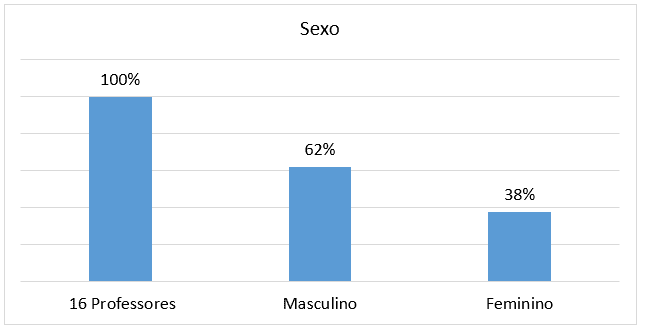
The research also revealed that there is a profile with a certain maturity, with an average age of 35 years, with a majority of which prevail at 35 to 45 years. The youngest teacher is between 18 and 25, and the oldest is between 55 years or older.
Graph 2 – Teachers’ Age
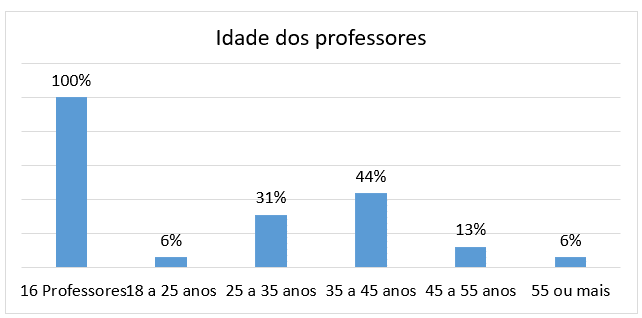
In relation to the place where these teachers reside, it is highlighted that teachers who work in the municipalities with the largest number of schools also reside in the municipality. The other teachers, who teach in the smaller municipalities, travel to these municipalities to work.
Figure 3 – Resides in which municipality
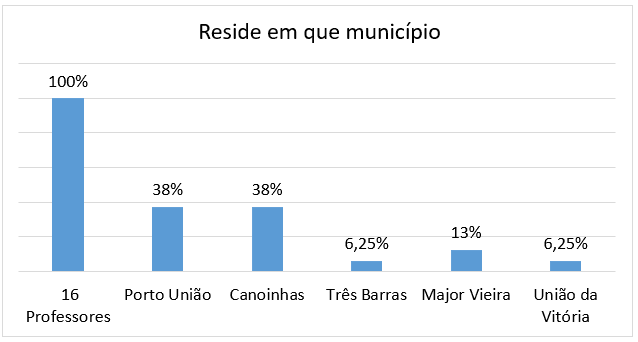
Source: survey data (2019)
In relation to the training of sociology teachers, of the 16 interviewees, 12 teachers have full training in Social Sciences/Sociology, the others have training in other areas such as Philosophy, History, Geography, Pedagogy and Magisterium.
The data shows the evolution of training in the discipline, because in the vast majority of times the discipline was taught by teachers from other backgrounds. This data is presented in the research conducted in 2012, 2013 and 2014 on the profile of sociology teachers in Brazil.
What is certain is that currently the discipline of Sociology is not taught only by professors licensed in Social Sciences/Sociology, which is evidenced by this research, which explains as a percentage of graduates in Sociology/Social Sciences only 61.3%. There is a very large deficiency in this aspect, which may be significantly compromising the greater consolidation of this discipline in the high school curriculum (BODART and SILVA, 2016, p. 178).
This data is also presented in another research, on the profile of this teacher in Brazil
Among the twelve curricular components of high school, the discipline of Sociology has the highest incidence of non-graduate teachers in the area: in 2013, it is observed that 88.2% do not have specific training (RAIZER et al., 2017, p.24).
In this direction, in 2014 a research was conducted in the state of Rio Grande do Sul, related to the professor of Sociology.
The reality in the case of RS shows that, even in 2014, those who teach sociology subjects in high school are mostly teachers who are formed in different areas of the social sciences. It cannot be denied that most teachers who teach sociology in schools in the state of January do not have an origin training in the area, mainly due to problems related to the distribution of charges in schools and also the continuity of scarcity of professionals (MOCELIN and RAIZER, 2014, p.123-124).
It is important to highlight that these researches aim to understand the profile of the professor who teaches Sociology, and present that most sociology professors are not licensed in the area. This data is related to research conducted in 2012, 2013 and 2014.
However, in 2019, this is not the scenario presented in the Regional Coordination of Education of Canoinhas, taking into account that the majority of teachers who teach sociology have training in the area. However, the Coordination still presents 4 teachers with training in other areas. This is still a challenge to be overcome, but when compared to the research mentioned in the text, the tendency is to eliminate these numbers of unlicensed professors in Sociology, in a reality not so distant.
Graph 4 – Teacher training
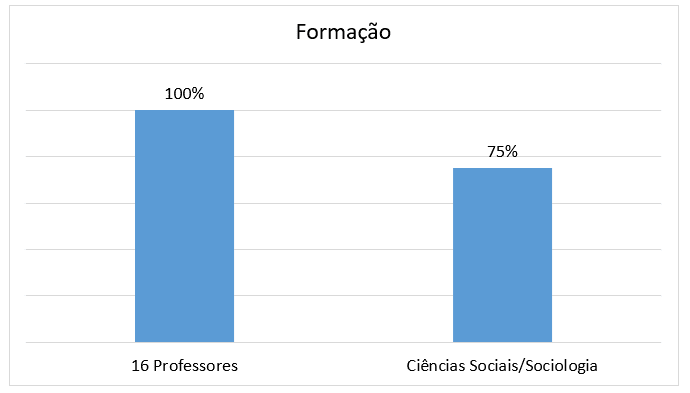
Another important fact, in the formation of these teachers, is that in addition to training in Sociology / Social Sciences, they are also trained in other disciplines. Being, 6 teachers formed in philosophy, 5 teachers in History, 2 teachers in Geography, 1 teacher in pedagogy and 1 teacher in teaching. Of the 16 teachers, only 1 teacher has a degree in Social Sciences.
This data of the teachers who teach sociology, with backgrounds in other disciplines, were also presented in other studies. The authors Bodart e Silva (2016, p. 177) presented in their research that the percentage of pedagogues and graduates in History is quite significant. Another research shows the same situation, “The training of teachers who teaches Sociology […] with emphasis on teachers with various higher educations (44% of the total), followed by graduates in History (20%), Pedagogy (12%), and Philosophy” (10%) (RAIZER et al., 2017, p. 19).
The research, conducted in 2014 by the authors Mocelin and Raizer (2014, p. 114), pointed out several professor’s training sings working in Sociology “stand out those with in other areas (31%), such as Pedagogy, Letters, Law, Theology, Psychology. Those with a background in Social Sciences and related areas focus on History (27%) Ph[…]ilosophy (10%), Geography (6.5%), and Social Studies (2%)”.
According to the research conducted, it is still consistent the information that teachers who teach sociology have other backgrounds besides social sciences, or only other training and not sociological.
Figure 5 – Other teacher training
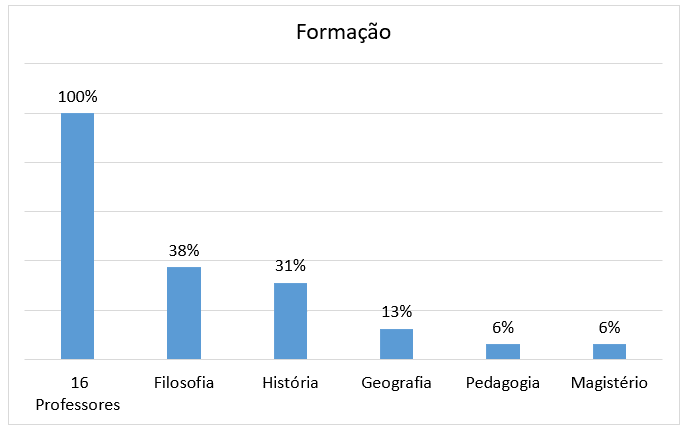
When asked about specialization, 14 teachers have specialization, 1 does not have and 1 is attending.
Still in teacher education, when asked about the master’s degree, it was highlighted that a minimum number of teachers with master’s degrees are presented: 4 master teachers, 2 did not answer, 1 is attending and 9 have no master’s degree.
Among the teachers interviewed, it is noteworthy that there are no doctors teaching Sociology at the Regional Coordination of Education of Canoinhas, 13 teachers answered that they did not have a doctorate, and 3 did not answer the question.
Table 2 – Continuing Education
| Specialization | Masters | Doctorate |
| 14 expert teachers | 4 master teachers | There are no doctors |
| 1 teacher has no specialization | 9 teachers have no master’s degree | |
| 1 teacher is attending | 1 teacher is attending |
Source: survey data (2019).
The research conducted, on the profile of this sociology professor, presented a deficiency in complementary training, directed at master’s and doctorate levels. This conclusion was presented when asked in the research by Raizer et al (2017, p 21) regarding the continuing education of sociology teachers “aiming at the continued training of teachers in service is well below expected”. In bodart e silva’s research (2016, p. 179), this information is also expressive.
[…] it is possible to notice that the majority (42.5%) of the sociology teachers questioned who work in high school have no complementary training. […] these data show, in addition to the large percentage of sociology[…] teachers, the deficiency in training, especially in the continuing education of those who teach Sociology in high school. In summary, we see that in addition to the deficiency of initial professionalization, there are limitations with regard to the continuing education of the sociology teacher.
It is noticed that this difficulty of complementary training is not only a problem of sociology teachers of the Regional Coordination of Education of Canoinhas, but of all regions of the country.
Another issue addressed is about the performance of teachers in teaching, and stood out, as a median, because it is well divided, factors that can result from the age group of teachers and their initiation into teaching activities within the teaching profession. It is observed that 4 teachers are in the teaching profession between 1 and 5 years, and another 4 between 15 and 20 years, not being teachers who are long in teaching. Another 3 teachers are between 5 and 10 years and 3 more between 20 years or more.
Graph 6 – Teachers’ working time in the Magisterium
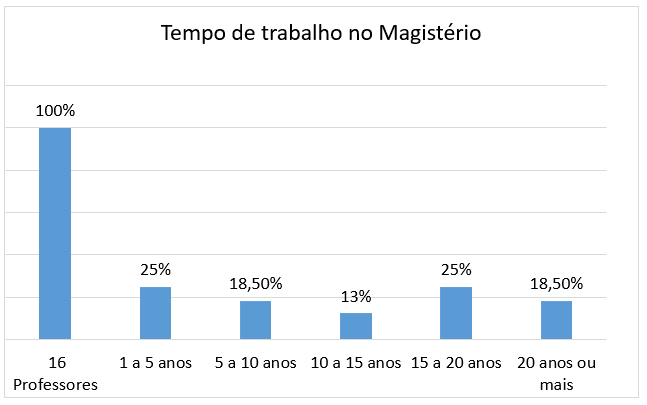
Source: survey data (2019)
During the period in teaching, these sociology teachers taught other subjects. Being that 11 teachers have taught Philosophy, 7 History, 6 Geography, 2 arts, 1 Religious education, 1 English, 1 Chemistry, 1 Psychology, 1 Physical Education, 1 Portuguese Language, 1 worked as a pedagogue and 1 did not answer the question.
Graph 7 – Other subjects that the teacher taught in teaching
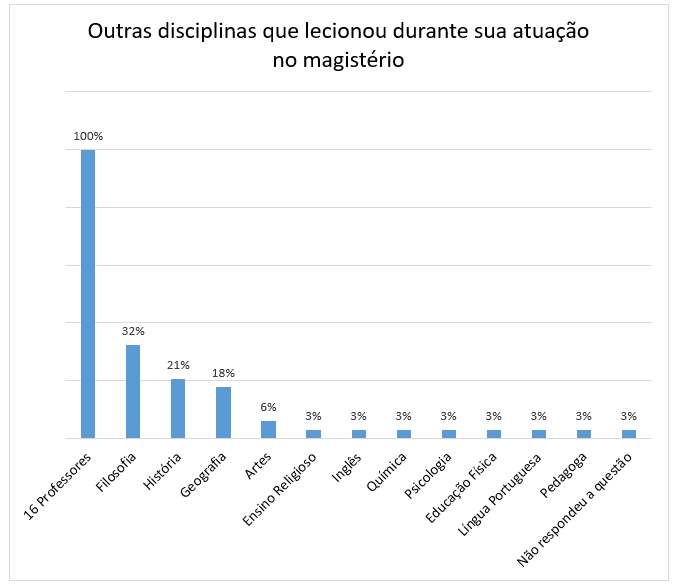
Source: survey data (2019)
With regard to the time of teaching in Sociology, it seems that most teachers teach sociology in a short time, because 6 teachers teach sociology in the period of time from 1 to 5 years. Only, 4 teachers teach for more than 10 to 15 years, 3 teach from 15 to 20 years, 2 teachers from 20 years and only 1 teacher in the period of 5 to 10 years. Taking into account all this data, it is not so long that most of these teachers teach the discipline of Sociology. This difference in time, referring to the performance among teachers, is also presented in another research.
In the research of Mocelin and Raizer (2013, p. 115), the time of performance of teachers in Sociology is identified.
Regarding the time of practice as a sociology teacher in high school, it is perceived that 67.5% of the respondents have been teaching the subject for up to 5 years, since it is consistent with the Law of mandatory. Most respondents have been working for less than one year as a sociology teacher in high school (27.3%); 26% work between 1 and 3 years and 14.3% work between 3 and 5 years with the discipline of sociology. Only 14% have been working for more than 5 years, and only 4% have been working for more than 10 years.
If we compare the data of the research presented with the data of the Coordination, it is perceived that there are no differences in time, and that most of these teachers have not been working in Sociology for a long time.
Graph 8 – Time as professor of Sociology
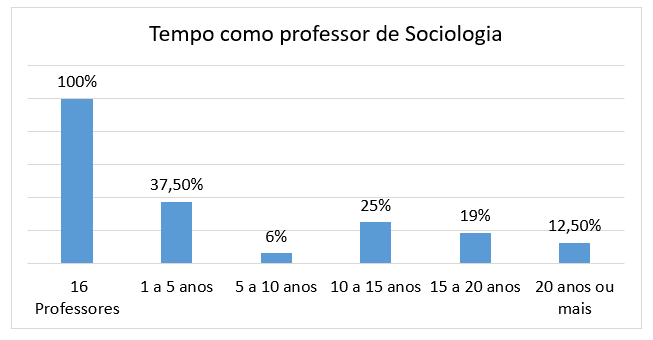
In the Regional Coordination of Education of Canoinhas, stand out: 10 effective teachers and 6 ACT teachers. The vast majority already belong to the staff of st. 100s.
Graph 9 – Type of bond between teachers and the State of Santa Catarina

Source: survey data (2019)
When teachers were asked about how many schools Sociology work on, 8 teachers answered that they work in two schools, 7 in 1 school and 1 in three schools.
This reality was also presented in Bodart e Silva’s research (2016, p. 186).
[…] 46.55% of teachers work in two or more schools, a considerable percentage of concern. Having to take a turn between two or more schools, their performance can be impaired by several factors, such as the difference between the organizational culture of the school, the loss of time shifting and the greater number of diversified plans according to different realities of the students.
This data is equally expressive in the research of Raizer et al., (2017, p.19), when teachers were asked about acting in schools, “58.9% work in two or more schools.
It is demonstrated that this is not only the reality of work of the teachers of the Coordination, but a data reflected throughout the country. That is, the need to travel and act in more than one school, to complement the workload.
Figure 10 – Number of schools teachers work in
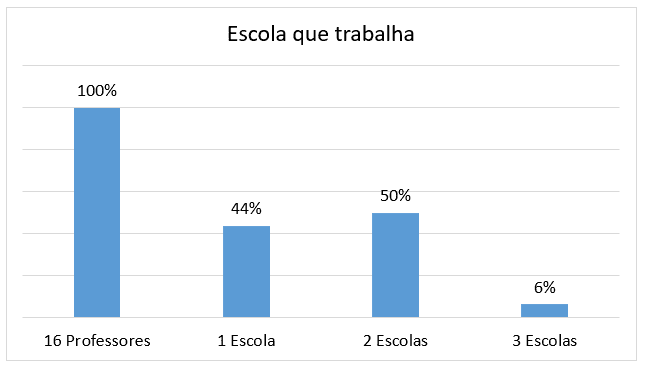
Regarding work in schools in the same municipality, 14 teachers work in the same municipality, and only 2 need to move to another city.
As it is up to these 14 teachers who work in the same municipality, they work in the two largest municipalities of the Coordination, where one municipality has 6 schools and the other with 7, being the largest number of sociology classes. These 2 teachers who travel through more than one municipality to work are in the two smallest municipalities of the Coordination.
Figure 11 – Municipality in which teachers work
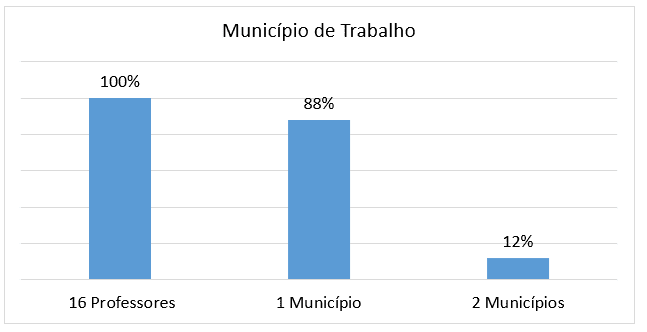
Source: survey data (2019)
Among the 16 sociology professors, 7 has a 40-hour workload, the other 9 teachers complement their load with other subjects. This is a reality presented in the research, which was made about the professor of Sociology. The authors Mocelin and Raizer (2014, p. 116) identified this information:
[…] there are very few who minister only sociology. Among the 154 professors who answered the research, only nine of them are dedicated exclusively to the teaching of sociology (6%), of which nine, eight are graduated in social sciences. […] most of the responding teachers are dedicated to teaching at least two other subjects, in addition to sociology (30%). This data may show a certain overload of teachers’ work, which may jeopardize the quality of sociology teaching. It is likely that the teacher from other disciplines is completing his workload with one or two periods of sociology.
The authors Raizer et al. (2017, p. 19), they also found this information in their research.
In addition to the finding of the demand of teachers, it is observed that “the typical professor of sociology of regular high school teaches another discipline(s) and is not exclusive to this stage of teaching”. Of the 47,961 sociology professors in the country, only 12.7% dedicate themselves exclusively to teaching this discipline.
This is the reality of the Coordination, along with the whole country. All the researches mentioned reach the same conclusion, directed to the performance of the professor of Sociology, which complements his workload with other disciplines, without exclusive dedication to teaching in the area.
Figure 12 – Weekly teacher workload
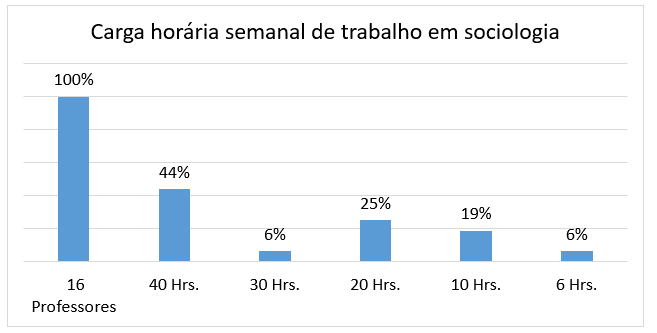
In the Regional Coordination of Education of Canoinhas, the subjects that are taught together with Sociology by teachers are: Philosophy with 6 teachers, History with 4 teachers and 1 geography teacher.
These subjects, are taught in other regions of the country by professors who work with Sociology, is what the research by Mocelin and Raizer (2014, p. 116), “The disciplines that are most taught concomitantly with sociology by the responding teachers are History (19%), Philosophy (12%), Integrated Seminary (7%), Religion (6%), Ethics (1.3%)”.
Another research also presents data pertinent to this issue.
Among the teachers who teach other subjects, the students who teach Philosophy, among those who work only in high school, are highlighted; among those who also work at other levels of education, the discipline of History stands out as the most taught concomitantly with sociology (RAIZER et al., 2017, p.19).
This reality faced by sociology teachers is visible in research on their profile and also in the Regional Coordination of Education in Canoinhas.
Graph 13 – Subjects that teachers teach beyond sociology
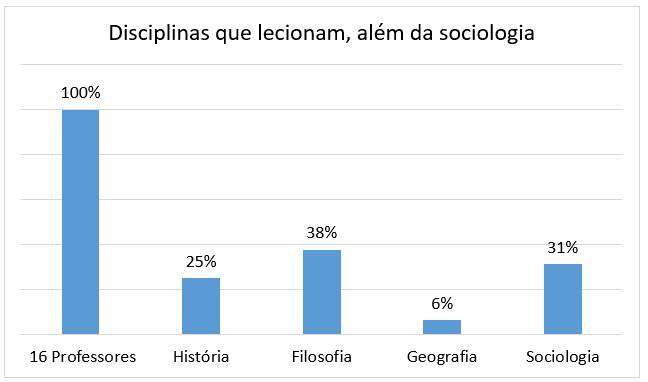
Regarding the grades worked, 14 teachers work in the 1st, 2nd and 3rd grades of high school. Most of them work with all the classes in the school.
Graph 14 – Series that teachers work on
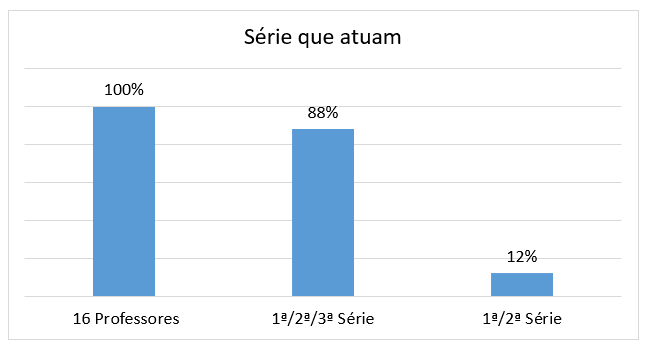
Source: survey data (2019).
In relation to the 2 teachers who work in the 1st and 2nd grade, it may be due to the complementation of the workload in Sociology, which happens, because the effective teachers supply the classes and the rest go to ACT, class developments and reduction of teacher workload.
FINAL CONSIDERATIONS
The sociology teachers of the Regional Coordination of Education of Canoinhas/SC are the majority of males, and the age group of most teachers is between 35 and 45 years, being professionals with a certain maturity. Most of these teachers live in the municipalities in which they work, so they do not need to move to other municipalities.
In relation to training in Social Sciences/Sociology, 12 teachers are qualified, this teacher also has other backgrounds, such as: Philosophy, History, Geography, Pedagogy and Magisterium. In this aspect, 14 teachers have specialization, 4 masters and no doctor.
In the time of work in teaching, this teacher is average, highlighting that these teachers do not have much time to work in teaching. Taking into account the age group of these teachers and their initiation into teaching. About the performance of this teacher, the vast majority have taught or even taught another discipline at the fundamental and middle levels.
In what is the role of this professor in sociology, it is median, because the vast majority has no more than 10 years of experience, being a discipline with few classes, recent in the school curriculum and serves as an option for other effective teachers of related disciplines to complete their workload, thus not giving room for much performance.
The vast majority of these teachers are effective. This effectiveness is in Sociology, Philosophy, History and Geography. These teachers work in two or more schools.
Also about the performance, 7 teachers have a closed workload in sociology, that is, 40 hours, the others complement their workload with other disciplines such as Philosophy, History and Geography. In relation to the classes worked, most work with the three high school classes.
The profile of the professor of sociology has already been the object of study of other research, regional, state and federal, by the authors: Mocelin and Raizer, Bodart and Silva and Raizer, Caregnato, Mocelin and Pereira. Being all these researchers, sociology teachers and interested in the theme of sociology teaching in the country.
Understanding the profile of the teacher is important and necessary, because the teacher as a mediator of knowledge is an individual who will collaborate with the training and preparation of his student for living in society.
REFERENCES
BODART, C. N; SILVA, S. O perfil do professor brasileiro de sociologia do ensino médio e sua percepção da condição docente. Revista de Pós-Graduação em Ciências Sociais da UFRN. Inter-legere.nº18 jan/jun de 2016. Disponível em: https://w.w.w periodicos.ufrn.br/interlegere/article/view/10820. Acesso 26 de out.2019.
CAREGNATO, C. E; CORDEIRO, V.C. Campo Cientifico-Acadêmico e a Disciplina de Sociologia na Escola. Educação e Realidade, v.39, p.39-47, 2014. Disponível em: http://www.scielo.br/pdf/edreal/v39n1/v39n1a04.pdf. Acesso 10 set.2019.
DURKHEIM, E. Educação e Sociologia. 11ª ed. São Paulo: Melhoramentos. 1978
JINKINGS.N.M.T.A sociologia em escolas de Santa Catarina. Revistainter-legere. Educação e Sociedade. 2013. Disponível em: https://w.w.w.periodicos.ufrn.br/interlegere/article/view/4407. Acesso 29 out.2019.
LAKATOS, E. M; Metodologia Científica. 4. ed. São Paulo: Atlas, 2001.
LAKATOS, E. M. Sociologia Geral / Eva Maria Lakatos, Marina de Andrade Marconi. – 7.ed. rev. e ampl. – 10.reimpr. – São Paulo: Atlas, 2010.
LIBÂNEO, J. C; OLIVEIRA, J. F; TOSCHI, M. S. Educação Escolar: política, estrutura e organização. São Paulo: Cortez, 2012.
MILLS, W. C. A imaginação sociológica. 4ª ed. Rio de Janeiro, Zahar, 1975.
MOCELIN, G.D. RAIZER, L. Ensino da sociologia no Rio Grande do Sul: Histórico da disciplina, formação do professor e finalidade pedagógica. Revista Brasileira de Sociologia.Vol.02.2014. Disponível: http://www.sbsociologia.com.br/rbsociologia/index.php/rbs/article/view/92. Acesso 02 out.2019.
MOTA, K. C. C. S. Os lugares da sociologia na formação de estudantes do ensino médio: as perspectivas de professores. Revista Brasileira de Educação. n. 29, p. 88-107, mai-ago, 2005. Disponível em: http://www.scielo.br/pdf/rbedu/n29/n29a08.pdf. Acesso 23 mar.2019.
RAIZER. L. et al. O ensino da disciplina de Sociologia no Brasil: diagnóstico e desafios para a formação de professores. Revista Espaço Acadêmico- n.190- Março/2017. Disponível em: http://w.w.w.periodicos.uem.br/ojs/index.php/EspacoAcademico/article/view/35759. Acesso 26 out.2019.
RIOS, T. A. Compreender e ensinar: por uma docência da melhor qualidade.2ªed.SP.Cortez.2001.
RUSSCZYK.J; LEITÃO.L.R.S. A formação de professores em Sociologia para o ensino no Oeste Catarinense. Florianopólis, v.13,n.01, p.06-22jan/jun.2012. Disponível em: http://www.periodicos.udesc.br/index.php/percursos/article/view/2421. Acesso 26 mar.2019.
SILVA, I. F. A sociologia no ensino médio: os desafios institucionais e epistemológicos para a consolidação da disciplina. Revista Cronos, v. 8, n 2, p. 403-427, julho-dezembro, 2007. Disponível em: https://w.w.w.periodicos.ufrn.br/cronos/article/download/1844. Acesso 26 mar.2019.
APPENDIX – FOOTNOTE REFERENCE
4. Research on the teaching of Sociology: Bodart e Silva (2016); Jinkings (2013); Mota (2005); Russczyk and Leitão (2012); Mocelin and Raizer (2013) and Raizer et al. (2017).
[1] Master in Development and Society in the line of Research Development Society and Education by UNIARP – University Alto Vale do Rio do Peixe – Campus Campus de Caçador (2019). He holds a Bachelor’s Degree and a Degree in Social Sciences with an Emphasis in Regional Development from the Universidade do Contestado – UNC -Caninhas (2013), Specialization in Teaching Methodology in History and Geography from the Centro Universitário Internacional (2014), Specialization in Teaching Methodology in Philosophy and Sociology from the Faculty of Administration Sciences Education and Letters (2016) and a degree in philosophy from the International University Center (2018). Specialist in Regional Development: Management, Economy and Production Processes by Faculdade Jangada (2018).
[2] PhD in Engineering and Knowledge Management.
[3] Advisor. PhD in Theology.
Submitted: December, 2020.
Approved: January, 2021.















